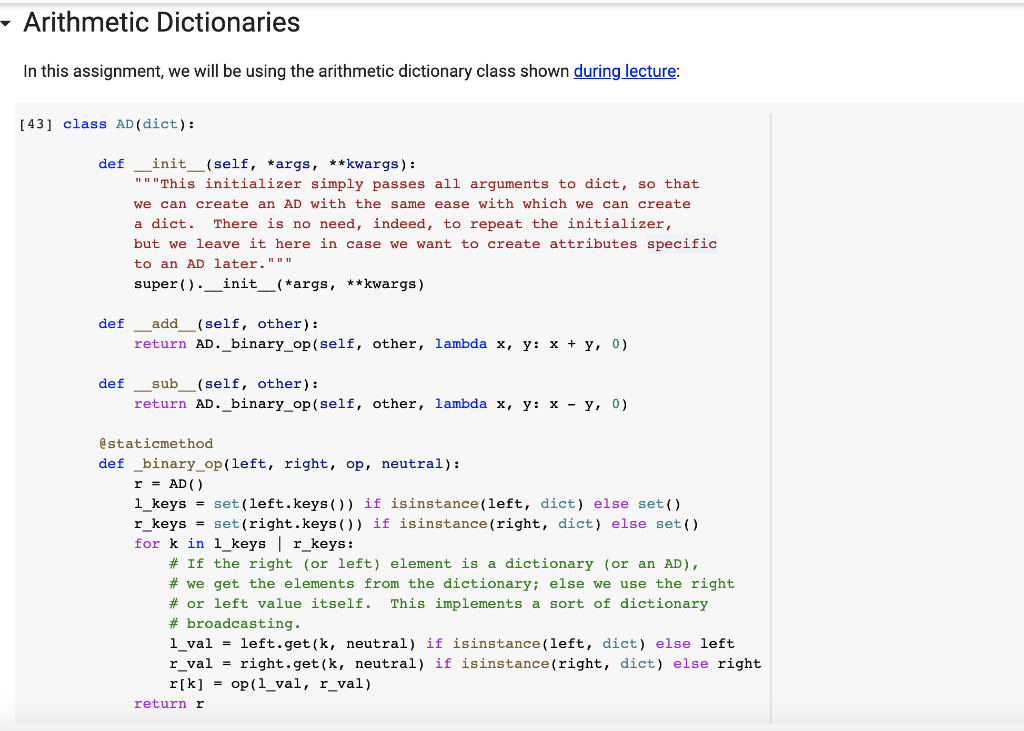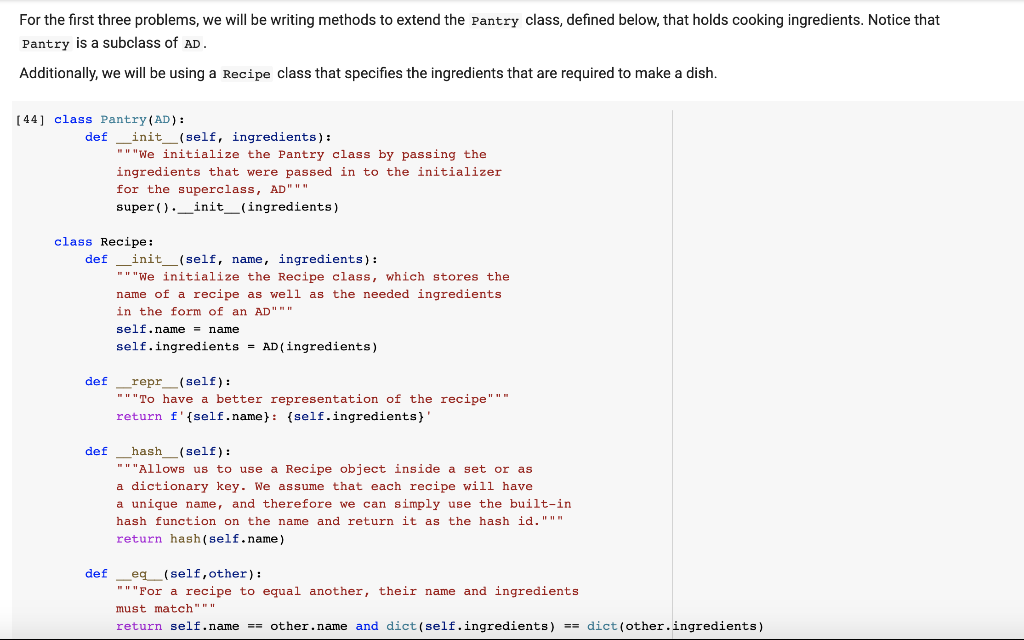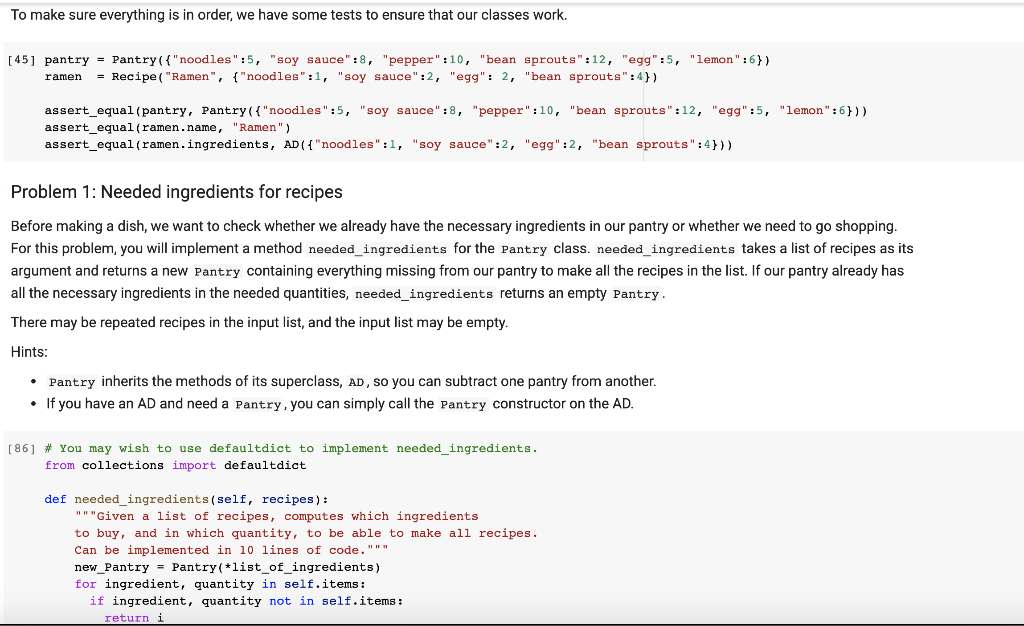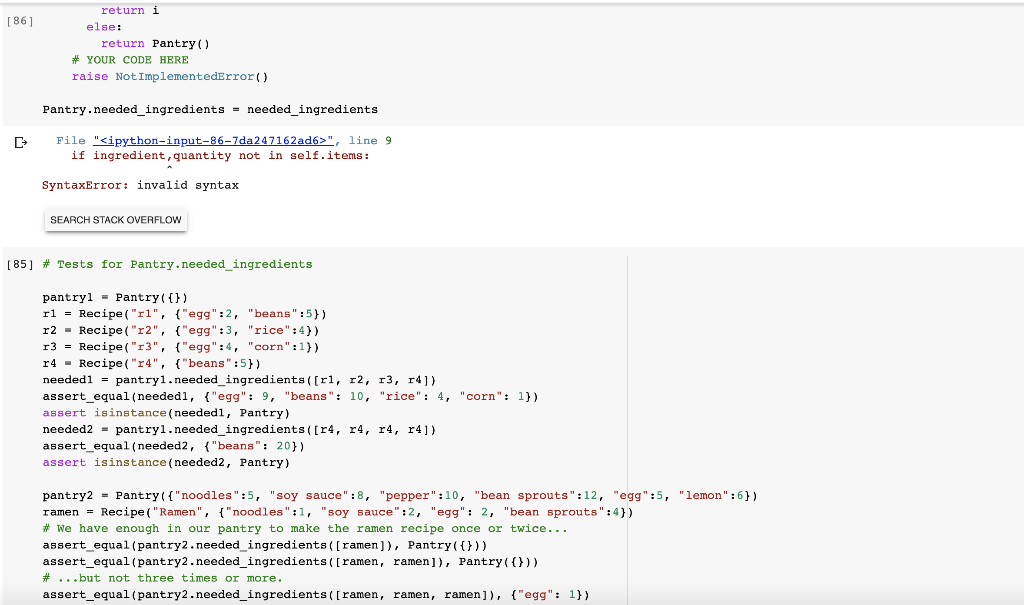Python Problem 1




- Arithmetic Dictionaries In this assignment, we will be using the arithmetic dictionary class shown during lecture: [43] class AD (dict): def _init__(self, *args, **kwargs): "" "This initializer simply passes all arguments to dict, so that we can create an AD with the same ease with which we can create a dict. There is no need, indeed, to repeat the initializer, but we leave it here in case we want to create attributes specific to an AD later.""" super() . _init__(*args, **kwargs) def_add__(self, other): return AD._binary_op(self, other, lambda x, y: x + y, 0) def sub_(self, other): return AD._binary_op(self, other, lambda x, y: x - y, 0) @staticmethod def _binary_op(left, right, op, neutral): r = AD() 1_keys = set(left.keys()) if isinstance(left, dict) else set() r_keys = set (right.keys()) if isinstance(right, dict) else set() for k in 1_keys | r_keys: # If the right (or left) element is a dictionary (or an AD), # we get the elements from the dictionary; else we use the right # or left value itself. This implements a sort of dictionary # broadcasting. 1_val = left.get(k, neutral) if isinstance(left, dict) else left r_val = right.get(k, neutral) if isinstance(right, dict) else right r[k] = op (l_val, r_val) return r For the first three problems, we will be writing methods to extend the Pantry class, defined below, that holds cooking ingredients. Notice that Pantry is a subclass of AD. Additionally, we will be using a Recipe class that specifies the ingredients that are required to make a dish. [44] class Pantry(AD): def __init__(self, ingredients): " "We initialize the Pantry class by passing the ingredients that were passed in to the initializer for the superclass, AD""" super() : _init__(ingredients) class Recipe: def __init__(self, name, ingredients): "" "We initialize the Recipe class, which stores the name of a recipe as well as the needed ingredients in the form of an AD""" self.name = name self.ingredients = AD( ingredients) def __repr_(self): """To have a better representation of the recipe""" return f'self.name}: {self.ingredients)' def __hash__(self): "" "Allows us to use a Recipe object inside a set or as a dictionary key. We assume that each recipe will have a unique name, and therefore we can simply use the built-in hash function on the name and return it as the hash id.""" return hash(self.name) def_eq__(self, other): """For a recipe to equal another, their name and ingredients must match""" return self.name == other.name and dict(self.ingredients) == dict(other.ingredients) To make sure everything is in order, we have some tests to ensure that our classes work. [45] pantry = Pantry({ "noodles":5, "soy sauce":8, "pepper":10, "bean sprouts":12, "egg":5, "lemon":6}) ramen = Recipe ( "Ramen", {"noodles":1, "soy sauce":2, "egg": 2, "bean sprouts":4}) assert_equal (pantry, Pantry({ "noodles":5, "soy sauce":8, "pepper":10, "bean sprouts":12, "egg":5, "lemon":6})) assert_equal(ramen.name, "Ramen") assert_equal(ramen.ingredients, AD { "noodles":1, "soy sauce": 2, "egg":2, "bean sprouts":4})) Problem 1: Needed ingredients for recipes Before making a dish, we want to check whether we already have the necessary ingredients in our pantry or whether we need to go shopping. For this problem, you will implement a method needed_ingredients for the Pantry class. needed_ingredients takes a list of recipes as its argument and returns a new Pantry containing everything missing from our pantry to make all the recipes in the list. If our pantry already has all the necessary ingredients in the needed quantities, needed_ingredients returns an empty Pantry. There may be repeated recipes in the input list, and the input list may be empty. Hints: Pantry inherits the methods of its superclass, AD, so you can subtract one pantry from another. . If you have an AD and need a Pantry, you can simply call the Pantry constructor on the AD. [86] # You may wish to use defaultdict to implement needed_ingredients. from collections import defaultdict def needed_ingredients (self, recipes): "" "Given a list of recipes, computes which ingredients to buy, and in which quantity, to be able to make all recipes. Can be implemented in 10 lines of code." new_Pantry = Pantry(*list_of_ingredients) for ingredient, quantity in self.items: if ingredient, quantity not in self.items: return i [86] return i else: return Pantry() # YOUR CODE HERE raise Not ImplementedError() Pantry.needed_ingredients = needed_ingredients File "
", line 9 if ingredient, quantity not in self.items: SyntaxError: invalid syntax SEARCH STACK OVERFLOW [85] # Tests for Pantry.needed_ingredients pantryl = Pantry({}) r1 = Recipe ("ri", {"egg":2, "beans":5}) r2 - Recipe ("r2", { "egg":3, "rice":4}) 13 = Recipe ("13", {"egg":4, "corn":1}) r4 Recipe ("r4", { "beans":5}) needed1 = pantryl.needed_ingredients([ri, r2, 13, 14]) assert_equal(needed1, {"egg": 9, "beans": 10, "rice": 4, "corn": 1)) assert isinstance (needed1, Pantry) needed2 - pantryl.needed_ingredients([r4, r4, r4, r4]) assert_equal (needed2, {"beans": 20}) assert isinstance (needed2, Pantry) pantry2 = Pantry { "noodles":5, "soy sauce":8, "pepper":10, "bean sprouts":12, "egg":5, "lemon":6}) ramen = Recipe ("Ramen", { "noodles":1, "soy sauce": 2, "egg": 2, "bean sprouts":4}) # We have enough in our pantry to make the ramen recipe once or twice... assert_equal (pantry2.needed_ingredients([ramen)), Pantry({})) assert_equal (pantry2.needed_ingredients([ramen, ramen]), Pantry({})) # ...but not three times or more. assert_equal (pantry2.needed_ingredients([ramen, ramen, ramen]), ("egg": 1))










